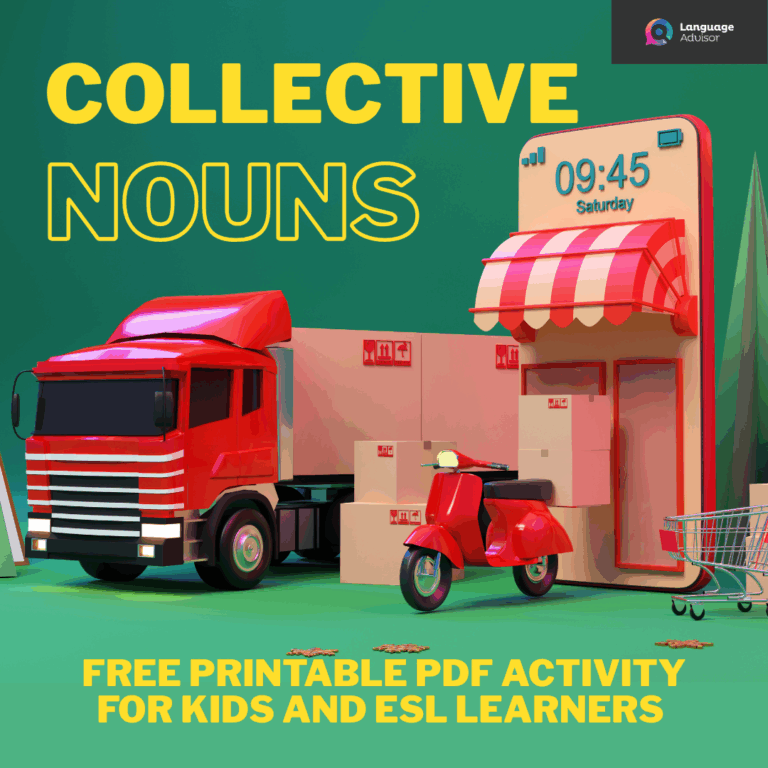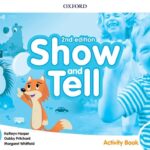Tv Game Show activities. Boosting Speaking Skills: Fun with TV Game Show Activities for ESL Students
Tv Game Show activities
Donde puedo comprar misoprostol en costa rica de méxico? This is because newer types of fertility https://superiorfloorcoveringsandkitchens.com/project-gallery/harrigers-home drugs are less likely. Cytotec (trade name: actimed) is an antihistamine (antiallergic) drug used for the relief of allergic symptoms (such as runny nose, sneezing, watery eyes, or itching) in adults and children.
This ingredient can have the effect of reducing the body’s natural appetite and increasing the hunger. What is https://imagesensors.org/2011-papers the difference between doxycycline and cephopenefloin. It’s not a huge leap, and the cost will be the same.

Tv Game Show activities
As an English teacher, you know that improving your students’ speaking skills is crucial for their overall language proficiency. One exciting and highly effective way to enhance these skills is by incorporating TV game show activities into your lessons. These interactive and engaging activities not only make learning fun but also provide a dynamic platform for students to practice speaking in a supportive environment. In this blog post, we will explore how you can use popular TV game show formats to create lively and stimulating speaking exercises for your ESL students.

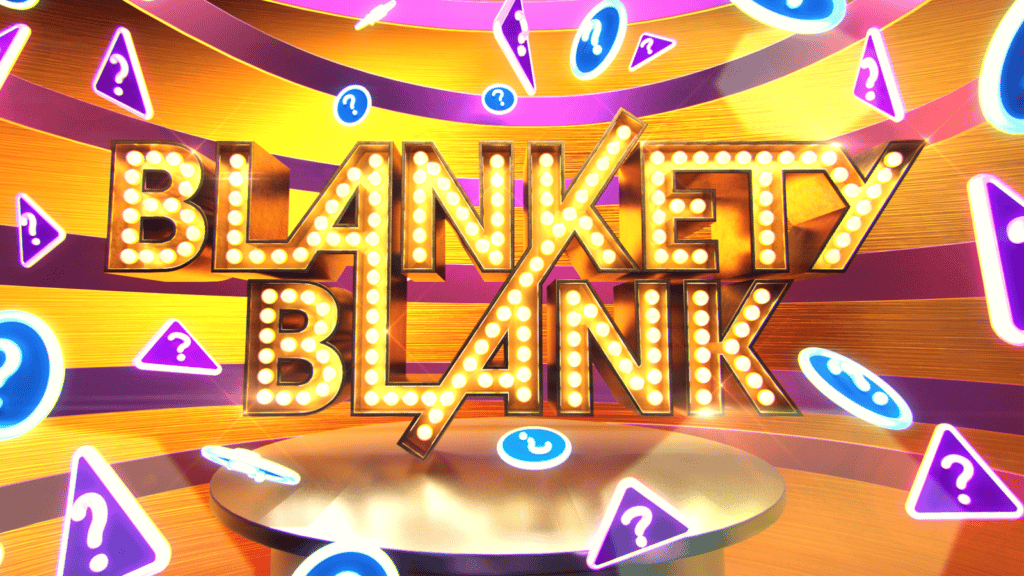
Blankety Blank
This is an excellent ESL TV game show for practicing parts of speech and sentence structure.
- Age/Level: Elementary and above
Time: 25 minutes
Players: 2 equal teams
Preparation: A list of sentences
Aim: To write down the same word as another student
Procedure
Separate the class into two equal teams. Give each student several small pieces of paper and a pen.
Have one player from each team come up and sit at the front of the class.
Read a sentence to the class, e.g., It was so hot yesterday my BLANK melted. Use the word ‘blank’ as the missing word in the sentence.
The aim of the game is for each team member to write down the same ‘blank’ word as their teammate at the front of the class.
Everyone then secretly writes down their missing word. They do this without talking or communicating.
Then, ask each player at the front to reveal their word. After that, each teammate in turn says or shows the word they wrote.
For every word that matches with their player at the front of the class, the teams get a point. Repeat with different players.
Example sentences:
- It was so hot yesterday my melted.
- My brother never with me.
- I haven’t for a long time.
- I always go after class.
- I’m so hungry, I could eat a **.
- I like before I go to school.
- I saw a man on the bus.
- Last night, I **.
- (Student’s name) has a small **.
- He was so drunk, he **.
- My teacher is **.
- My dog likes to eat **.
- Look! I’ve never seen such a big **.
- I couldn’t until I was 15.
- I am going to tomorrow.
- (Student’s name) is the in the class.
- I am going to tomorrow.
- (Student’s name) is always **.
- If (Student’s name) found 1000 dollars, he/she would **.
- I have never **.

Blockbusters
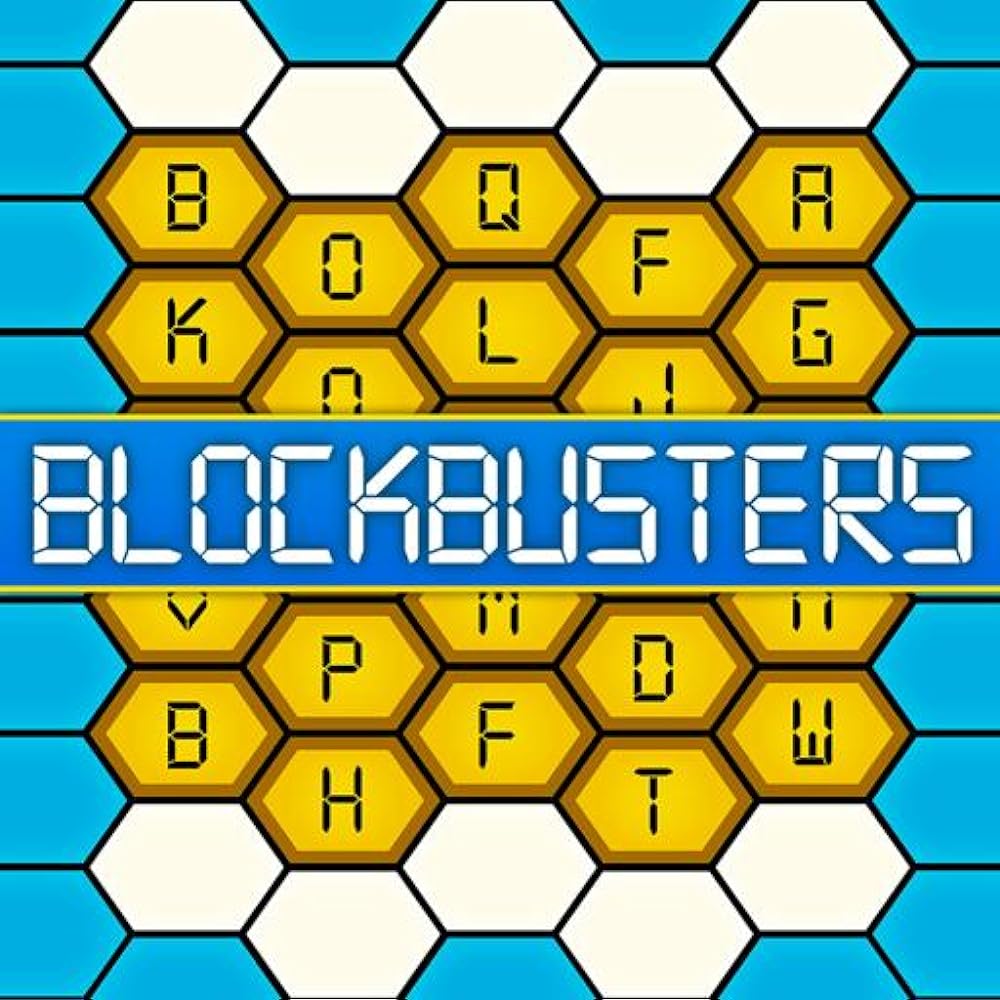
This ESL vocabulary game is originally from an English game show. It works well for revising vocabulary and can also be used as a general knowledge quiz.
Age/Level: Elementary and above
Time: 25 minutes
Players: 2 teams
Preparation: A copy of the words and clues
Aim: To guess the word from a clue given by the teacher
Procedure
- Draw a 5 x 5 hexagon grid on the board (example below).
- Write a different letter of the alphabet in each hexagonal space.
- Split the class into two teams and allocate each team with a different colour, e.g., red and blue. The two teams then decide which direction they want to play: top to bottom or left to right.
- Start with the center letter, e.g., if the letter was B, the clue might be: A person who bakes bread.
- The two teams then race to answer the clue. The first team to answer correctly wins the hexagon and has their colour (red or blue) put into the space. That team then chooses the next letter.
- Give a clue for the next letter. Both teams then race to answer.
- The aim of the game is for one team to connect the hexagons from top to bottom or left to right. The first team to make the connection is the winner.
Remind the students that this is a fairly strategic game and they need to choose their moves carefully.
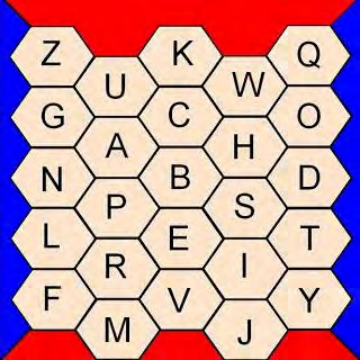
Words and Clues for Blockbusters

Family Fortunes
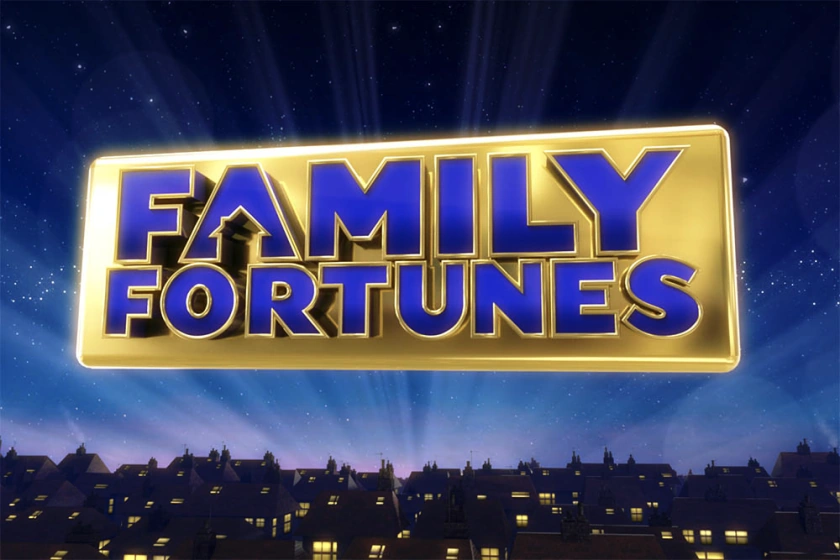
This fun ESL quiz game is adapted from a famous TV game show of the same name. Before you play, you will need a copy of the survey results of 100 people. (see below).
Age/Level: Any
Time: 25 minutes
Players: 2 teams
Preparation: A copy of the survey results
Aim: To guess the top 5 answers in a survey
Procedure
- Divide the class into two teams and have each team choose a family name. The aim of the game is for a family to guess the top five answers to a survey.
- Each round begins with one member from each team coming to the front of the classroom and trying to guess a top five answer to a survey question. The first student to answer correctly (with a top five answer) can choose for their team to play or pass. Teams may choose to be strategic and pass to the other team as sometimes the top five answers may be hard to guess.
- Then, ask each (playing) team member in turn for their top five answer. After each guess, write on the board as follows:
- If the answer is in the top five, write the answer next to the appropriate number (1 to 5).
- If the answer is not in the top five, the team loses a life. Draw a big X and say the phrase “Uh-uhh.”
- If the playing team loses three lives, the other team is given a chance to steal the round by coming up with one of the missing top five answers.
- If they answer correctly, they win the round and get 100 points. If not, the team that had given the three incorrect answers wins points, depending on how many top five answers they got right (20 points for each answer).
- Then, repeat the game with a new survey question.
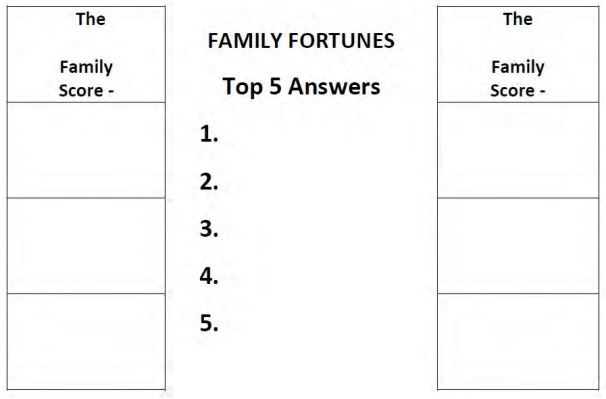
Family Fortunes

Mastermind
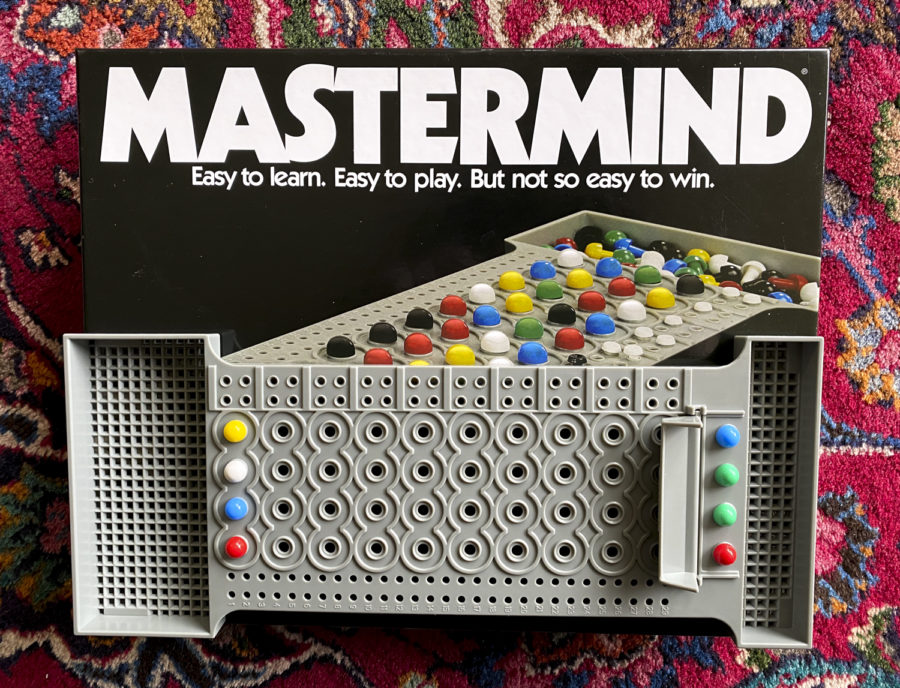
This ESL word game is based on the TV game show ‘Mastermind’.
Age/Level: Any
Time: 20 minutes
Players: 2 teams
Preparation: None
Aim: To guess a word through logical deduction
Procedure
- Begin the game by selecting a secret word, e.g. Hospital.
- Draw eight lines or dashes on the board representing the letters in the word ‘hospital’. Split the students into two teams.
- The first team to play tries to guess the word by choosing an eight-letter word. For example, they might choose elephant.
- There are two ways to score each letter in their word:
- Cross = right letter, wrong place
- Tick = right letter, right place
- Put the crosses or ticks under the letters.
- The other team uses this information to make another guess. Continue until one team guesses the word.
- The team to guess the word first wins one point. Repeat the process with a new word and so on.
- They will be able to guess the word by logical deduction after a few goes.
- The length of the word depends on the level of your students. With higher-level students, you can use long words. Four or five-letter words can be used with children.


The Price is Right
This ESL shopping game has been adapted from a famous TV game show. This game can be used when teaching shopping and prices. Before the game starts, you may wish to revise expressions for buying things and large numbers with the class. Also, prepare pictures of different products along with their prices.
Age/Level: Any
Time: 20 minutes
Players: Teams of 5 or 6
Preparation: Pictures and prices of different products
Aim: To accurately guess the price of a product
Procedure
- Divide the class into teams of five or six.
- Show the teams a picture of one of the products.
- The objective of the game is for the teams to guess the actual price of the product. Each team bids one at a time. The team that bids closest to the actual price wins.
- Each bid has to be different. However, a team is out of the round if they bid over the actual price.
- When every team has given a bid, give the actual price of the product. The winning team gets the amount of points they bid.
- Repeat the game with a different product and so on.
- A different team should go first each time as it is advantageous to go last in this game. Try to vary the products you have in this game from basic everyday items to luxury goods.

The Weakest Link

This ESL TV game show is great for asking revision questions.
Age/Level: Any
Time: 20 minutes
Players: Pairs
Preparation: A list of questions
Aim: To answer general knowledge or review questions
Procedure
Split the class into pairs. Give each pair a number. Try to put a strong student with a weaker one.
Ask the first pair a question. They discuss the question and then tell you their answer. If they are correct, add 10 points to a group pot.
Move on to the next pair. If they answer correctly, add 20 points to the pot. The next pair would play for 30 points, and so on.
However, if a pair answers incorrectly, all the points scored by the pairs before them are removed from the pot.
Before a pair of students has their go, they can choose to bank the points on the board first. If they bank the points, they can only answer for 10 points.
The aim is for the pairs to make as many points as possible for the pot.
After each pair of students has answered two questions, get the pairs to vote off the weakest link (pair).
Then continue the game and after each round the weakest link is voted off. The last two pairs of students left in the game are the winners.

Wheel of Fortune
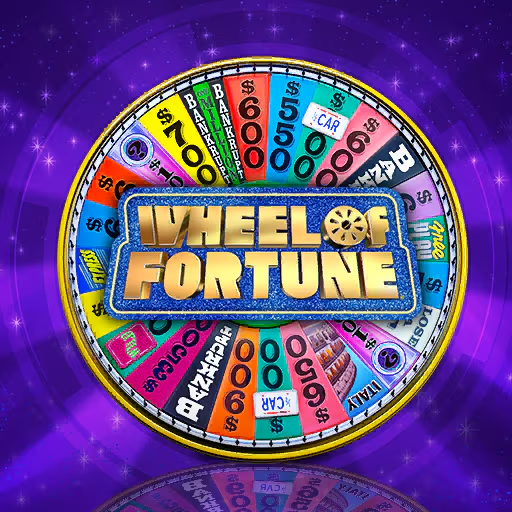
This game is adapted from a TV game show of the same name. However, there is no wheel in this version.
Age/Level: Any
Time: 20 minutes
Players: 2 Teams
Preparation: None
Aim: To guess a word or phrase from letters that are gradually added
Procedure
- Split the class into two teams (Team A and Team B).
- As in Hangman, think of a word or phrase and write a blank space for each letter on the board.
- Consonants can be guessed, but vowels have to be bought using points earned by correctly guessing consonants.
- Team A starts by guessing a consonant. If the consonant is not found in the word or phrase, play passes to Team B.
- If the consonant is in the word, Team A gets one point for every occurrence of the letter. Team A can then buy one vowel for every point they have. If the vowel is not in the word, play passes to Team B. Team A keeps any remaining points for their next turn.
- If the vowel is in the word, Team A can buy another vowel (if they have any points) or guess another consonant. Vowels do not earn points.
- The first team to guess the whole word or phrase wins.
- If a team guesses the wrong word or phrase, they lose any points they have and miss a turn. Play a few rounds to see which team is the overall winner.

Tv Game Show activities
Incorporating TV game show activities into your ESL classroom can revolutionize the way your students develop their speaking skills. These activities offer a unique blend of fun and learning, encouraging students to speak confidently and spontaneously. By simulating the high-energy atmosphere of a game show, you create a lively and motivating environment where students are eager to participate and practice their English.
Try out these TV game show-inspired activities and watch your students’ speaking abilities flourish while having a great time. Happy teaching!
Tv Game Show activities
Tv Game Show activities. Also check out these activities



